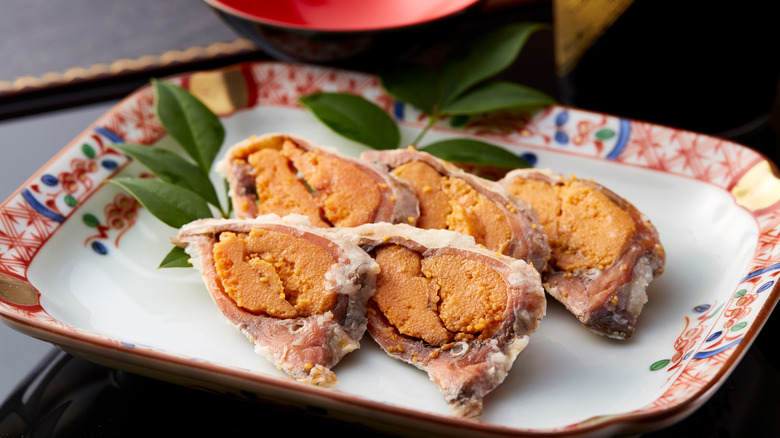The Unexpected Thing The Oldest Type Of Sushi In Japan Tastes Like
The neat, brightly colored, sashimi and nigiri that we enjoy are far from the initial version of sushi. According to PBS, the original sushi was a fermented food for the same reason that pickles are — preservation. Japan's earliest form of sushi is said to have originated more than a millennium ago near the country's largest freshwater lake and has become a staple in Japanese culinary tradition.
While some folklores and legends attempt a fantastical narrative of the origination of sushi, the true story is that it was introduced in Japan during the eighth or ninth century to the upper class (via PBS). A fish known as golden carp or funa was caught in the lake and then packed with salted rice. During fermentation, lactic acid bacteria would form, and in combination with salt, it prevented the fish and rice from spoiling. According to CNN Travel, eating the fermented rice and fish together formally as a meal would now be known as narezushi, funazashi, or "aged sushi."
The surprising smell and taste of aged sushi
There may be few who know how fermented fish tastes, considering that fermentation is generally associated with decay. Be that as it may, there is a perfectly safe way to experience it. According to Sushi School, although rare, it still exists and is attainable at a steep price.
In a small Japanese town called Takashima near Lake Biwa, the area narezushi originated from, exists an opportunity to try out the ancient delicacy, per BBC Travel. The preparation process for this rare food is lengthy. According to Atlas Obscura, it can take anywhere between one and three years, and as you can imagine, the aroma may not be inviting. The smell is comparable to "tangy blue cheese, feet, and perhaps a whiff of ammonia," says Jess Kapadia from Food Republic.
The process of lacto-fermentation leaves the fish tasting like cheese. In an interview with CNN Travel, Kazuyuki Ohashi, executive chef of the Lake Biwa Marriott Hotel, says that it is too sour and pungent to consume regularly, so it should only be saved and eaten for special occasions.

